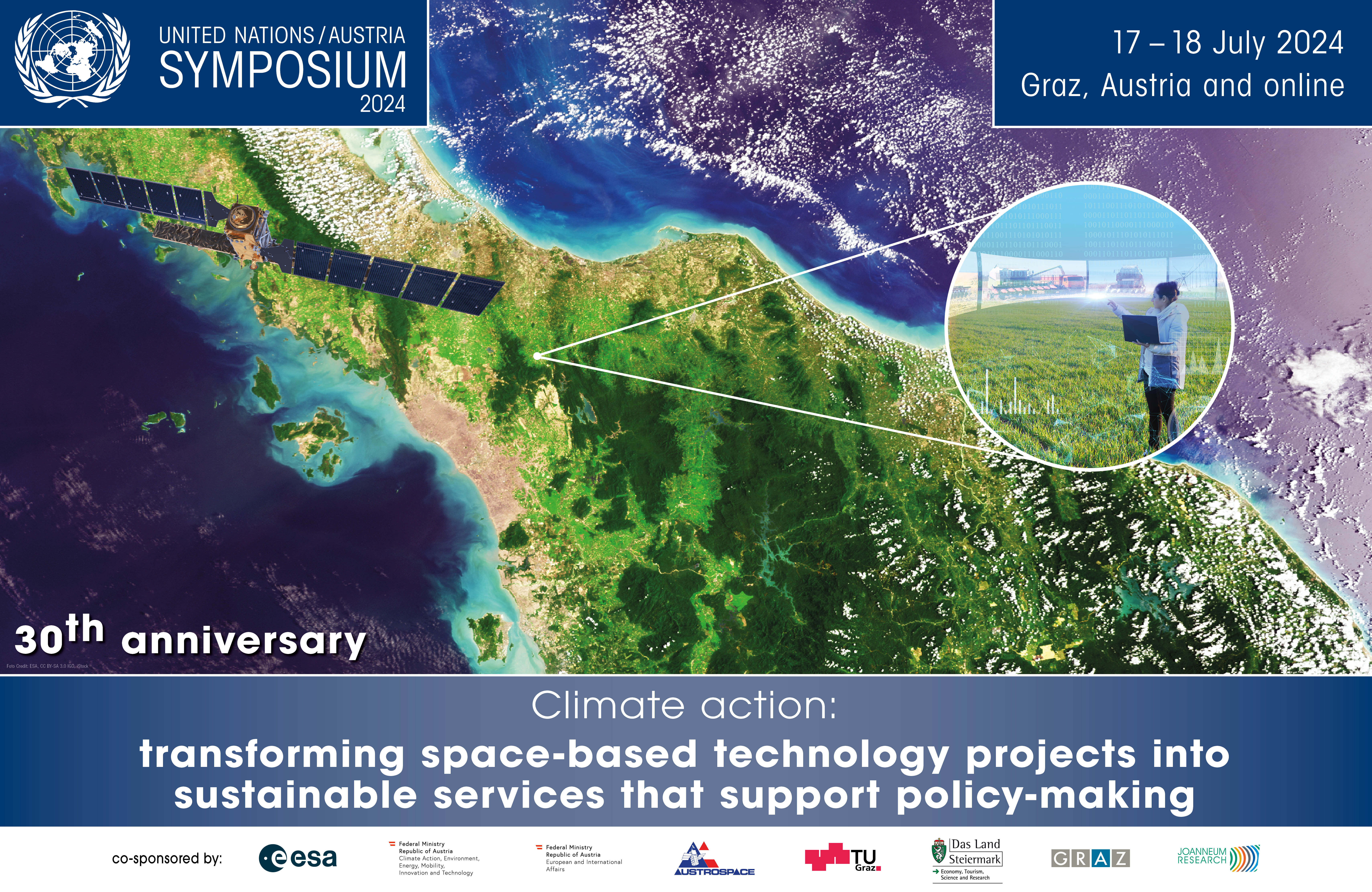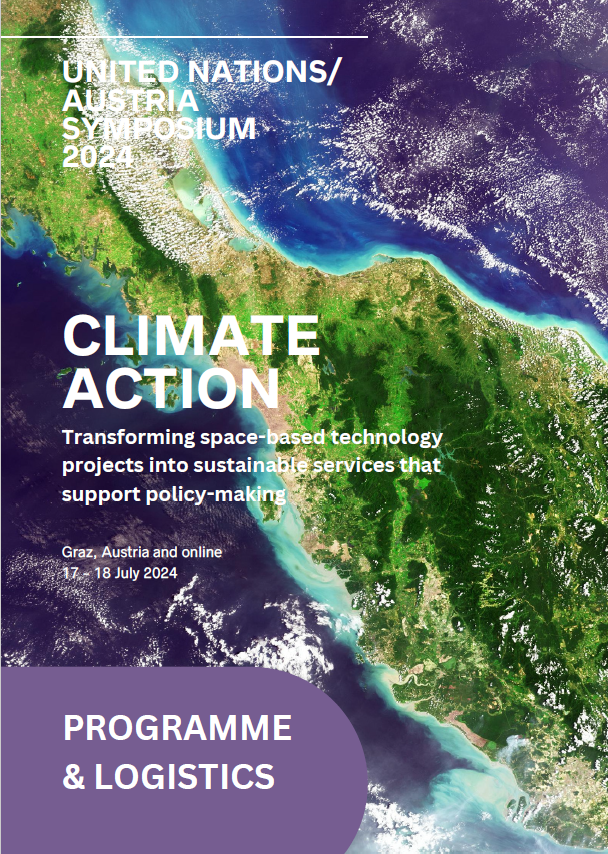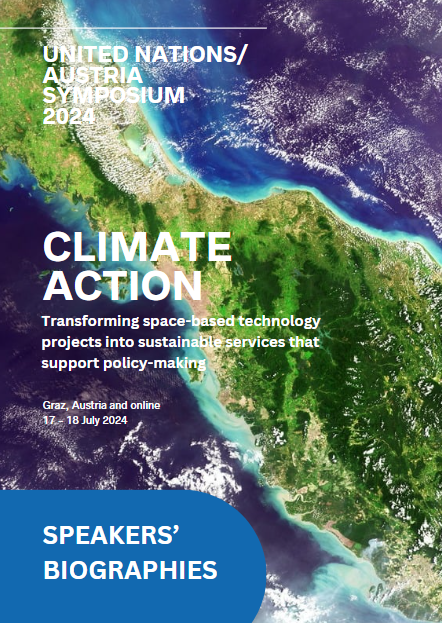UN/Austria Symposium 2024
Climate action: transforming space-based technology projects
into sustainable services that support policy-making
17 and 18 July 2024
Graz, Austria & Online
REGISTRATION CLOSED
Important dates
- Final programme has been released
Theme
Space applications and technologies have significant potential to contribute to mitigating and adapting to the effects of climate change. Every year there are demonstrations of new innovative technologies and launches of pilot projects that promise to address issues of forest fires, land degradation, floods, droughts, loss of biodiversity, agriculture, disaster management and more. Yet, many of these projects struggle to take off or fail to achieve long-term success. Beyond technical feasibility in the transition from a technical project to a sustainable service is a lack of understanding of how to make it happen.
Technical innovation without effective implementation does not lead to meaningful change. Taking the right steps to transform a technical project into a sustainable service with tangible measurable impact on people's lives is essential to ensure that those who need solutions are empowered and those who can help do so in a financially viable and responsible way. Successful cases integrate and manage social, financial, political and regulatory dynamics to accelerate the transformation.
The UN/Austria Symposium 2024 aims to bridge the gap between space applications and technologies providers, users and wider community. It aims to provide a diverse and inclusive multi-stakeholder platform to raise awareness of the challenges in transiting from a technical project into a sustainable service and facilitate knowledge exchange and sharing of lessons on how to successfully do so. The symposium in Graz will offer a possibility to share lessons learnt and success factors in transforming projects into sustainable services for climate action.
The presentations and discussions will address the role of governmental support, financing, capacity building, users empowerment, impact measurement metrics, amongst others. Successful case studies from various countries and organisations will also be discussed. The symposium aims to stimulate cross-fertilization of ideas and experience among policy makers, service providers, the private sector, academia and user communities and foster collaborations among different groups.
Objectives
The symposium has the following objectives:
- To demonstrate how initiatives based on space applications have been successfully developed and implemented in different countries.
- To promote the exchange of best practices in transforming technical projects into sustainable services that have measurable impact and meet the demand and needs of developing countries in mitigating and adapting to climate change.
- To share experiences and explore how space-based services can be used to comply with or support policies about climate action according to national priorities.
- To present available toolboxes that have already been implemented through case studies or pilot projects at a country level to comply with regulations related to climate action, with the aim of encouraging the adoption of tested tools and approaches.
- To raise awareness of the Space for Climate Observatory (SCO), relevant space-related activities, services and cooperation programmes among different user groups, in particular government officials, the diplomatic community, UN and international agencies as well as non-governmental organisations.
- Create opportunities for cooperation and collaboration with funding organisations and international organisations.
- To report to the UN Committee on the Peaceful Uses of Outer Space through the Scientific and Technical Sub-committee.
Programme (timezone: CEST)
The programme includes:
- Keynote presentations: given by invited speakers.
- Panel discussions: roundtables during which speakers give a short presentation, followed by a moderated discussion among speakers and Q&A with the audience.
- Country case: a panel discussion focusing on a particular country.
- Video pitches: short presentations introducing specific projects or initiatives in less than 5 minutes.
- Social events: evening receptions, as well as a guided tour of the city of Graz.
- Networking opportunities.
| Tuesday, 16 June 2024 | |
|
18:00
|
Reception hosted by the Mayor at Graz City Hall |
| Wednesday 17, July 2024 | |||
|
9:50
|
WebEx opens | ||
| 10:00 | Introduction | ||
| Xing Yi Ang, UNOOSA
. |
|||
| 10:05 | Welcome ceremony | ||
|
Chair
|
Michael Schoenhuber, Joanneum Research | ||
| Aarti Holla-Maini, UNOOSA | |||
| Matthias Rüther, Joanneum Research | |||
| Hans Steiner, Austrospace | |||
| Margit Mischkulnig, Federal Ministry Climate Action, Environment, Energy, Mobility, Innovation and Technology (BMK), Austria | |||
| Peter Piffl-Percevic, City of Graz | |||
| Josef Smolle, Region of Styria | |||
| Thomas Hollensteiner, Permanent Mission of Austria to the United Nations in Vienna | |||
| 10:45 | Keynote presentation | ||
| ------------------ | ESA Space Technology for Climate Action
. |
Simonetta Cheli, European Space Agency (ESA) | |
| 10:55 | Musical performance | ||
| 11:05 | Group photo and coffee break | ||
| 11:30 |
Session 1: User engagement: how meaningful dialogues lead to sustainable initiatives
This session presents how a range of initiatives about climate action have been involving future end users - from inception of the project and throughout the development phase, a continuous dialogue is essential. |
||
|
Chair
|
Sophie Hoffmann, BMK, Austria | ||
| Operational satellite monitoring of water reservoirs at national level - Stockwater project | Pascal Kosuth, Ministry of Environment, France | ||
| Drought Watch project in Mongolia | Battsetseg Tuvdendorj, Information and Research Institute of Meteorology, Hydrology and Environment, Mongolia | ||
| Space-based projects supporting stakeholders: case studies from Morocco | Abderrahman Atillah, Royal Center for Remote Sensing, Morocco | ||
| Beyond the bubble | Patrick Pils, Leto Space, Austria | ||
| Integration of TropiSCO data into the national natural resources and forests observation system | Thierry Koleck, Centre National d'Etudes Spatiales (CNES) & Francis Manfoumbi, Gabonese Agency for Space Studies and Observations | ||
| 12:45 | Lunch | ||
| 13:45 | Project pitches | ||
| The Meghalaya project | Vishal Saraogi, Government of Meghalaya, India | ||
| Engaging local communities to enforce Bhanu Municipality's resilience to rain flood events | Nishchal Baniya, Nepal National Federation of Clubs and Associations for UNESCO, Nepal | ||
| 13:55 |
Panel 1: User engagement: lessons learnt and recommendations
The panel will provide insights and recommendations from users who adopted a new technical solution and solution developers on how to conduct discussions with user communities throughout the development of an initiative. |
||
|
Moderator
|
Anne-Claire Grossias, UNOOSA | ||
| Antonella Tornato, Istituto Superiore per la Protezione e la Ricerca Ambientale (ISPRA), Italy | |||
| Mariana Damova, Mozajka, Bulgaria | |||
| Zonghan Ma, Chinese Academy of Sciences, China | |||
| Maria Zubair, Punjab Information Technology Board, Pakistan | |||
| Angela Veitch, Permanent Mission of Canada to the International Organizations in Vienna | |||
| 14:55 | Coffee break + Project demonstration by SCO | ||
| 15:15 |
Indonesia country case: Hotspot for climate action
The session will present how Indonesia supports its national policy against climate change through concrete implementations of space-based projects and introduce initiatives that support the transition of technical projects into sustainable services at the national, regional, and local levels. |
||
|
Chair
|
Xing Yi Ang, UNOOSA | ||
| National space policy and programme to support sustainable services for climate action in Indonesia | Erna Sri Adiningsih, National Research and Innovation Agency (BRIN) | ||
| Space technology for climate action in Indonesia | Muhammad Rokhis Khomarudin, BRIN | ||
| SiPongi - Forest and land fire monitoring system | Eva Famurianty, Ministry of Environment and Forestry | ||
| IT in (climate) action | Diah Saraswati, Nusantara CompNet Integrator | ||
| 16:20 |
Session 2: Support and funding opportunities for space for climate action
The session will present various technical, financial, and capacity-building opportunities supporting space for climate action offered by major institutions. |
||
|
Chair
|
Selima Ben Mustapha, Swedish Space Agency
|
||
| Space for Climate Observatory: support opportunities for space for climate action | Frederic Bretar & Laurence Monnoyer-Smith, Space for Climate Observatory (SCO), Centre national d'études spatiales (CNES), France | ||
| Enhancing the well-being of society by achieving the Sustainable Development Goals | Sharif Muhammad, Islamic World Educational, Scientific and Cultural Organization (ICESCO), Morocco | ||
| EUSPA: space downstream innovation | Maximilian Bauernfeind, European Agency for the Space Programme (EUSPA) | ||
| China's Earth observation promotes global climate action | Bonan Wu, Earth Observation System and Data Center (EOSDC), China | ||
| 17:00 | Wrap-up and adjourn | ||
| 18:30 | Guided walking tour of the old city of Graz | ||
| 19:30 | Reception hosted by the Governor of Styria at the Orangerie in Grazer Burggarten | ||
| Thursday, 18 July 2024 | ||
|
------9:50
------------
----
|
WebEx opens | |
| 10:00 |
Panel 2: Capacity building: implementing new tools for widespread and effective use
This panel will discuss successful methods to integrate new tools into daily activities of various end user communities. Speakers will present what works best and discuss their experiences in replicating successful capacity-building initiatives in different contexts. |
|
| ----9:50 -- ------- |
Moderator
|
Anne-Claire Grossias, UNOOSA
|
| Deepak Kumar Mohapatra, Alliance for Rural Electrification, India | ||
| Darunee Prochot, Geo-Informatics and Space Technology Development Agency (GISTDA), Thailand | ||
| Maria Mateo & Noel Raboy, IBISA & CLIMBS project, Spain & Philippines | ||
| Sazzad Hossain, Band-SOS, Bangladesh | ||
| 11:00 | Coffee break + Project demonstration by SCO | |
| 11:30 |
Project pitches
|
|
| Contribution of the Space for Climate Observatory to the development of MEOSS | Thomas Ferrero, Maps Earth Observation Satellite Services (MEOSS), France | |
| Mapping chlorophyll levels in vegetation across the Kingdom of Bahrain: insights from Sentinel-2 time series analysis for informed agricultural management and sustainability | Aysha Yusuf Almahmeed, National Space Science Agency (Bahrain) | |
| Risk management tool for rural water utilities in Costa Rica | Natalia Rodriguez, Casa de Agua, Costa Rica | |
| 11:45 |
Session 3: Funding and financing technical projects: show me the money
Through presentations by successful companies and sharing of financial insights by investors and international financial institutions, this session will discuss the challenges of raising capital and the importance of diversity in funding and financing support at various stages of a company's life cycle with the aim to scale up pilot projects into viable business models. |
|
|
Chair
|
Xing Yi Ang, UNOOSA
|
|
| Balancing tech and human touch to de-risk and strengthen agricultural supply chain | Kizito Odhiambo, AgriBora, Kenya | |
| DeepTech transforming AgriTech | Karim Amer, Visual and AI Solutions, Egypt | |
| Funding and financing climate adaptation tech in Africa | Maxime Bayen, The Catalyst Fund, Kenya | |
| The role of IFIs in financing green projects using space solutions | Fani Kallianou de Jong, European Bank for Reconstruction and Development | |
| 12:45 | Lunch | |
| 13:45 |
Project pitches
|
|
| Armenia Earth observation data cube | Shushanik Asmaryan, Center for Ecological-Noosphere Studies of the National Academy of Sciences of Armenia (CENS) | |
| National desertification assessment using geospatial data and proposal of intervention plan by priority in Algeria | Nasreddine Belabid, Algerian Space Agency | |
| Nurturing sustainable space governance for future generations: integrating climate science into space policies | Shrawani Shagun, TERI School of Advanced Studies, India | |
| 14:00 |
Session 4: Role of government and inter-governmental organization
The session will discuss the multi-faceted roles played by governments and inter-governmental organizations in promoting cooperation between technology providers and users, and the opportunities for sharing knowledge and fostering best practices in using space applications for climate action. |
|
|
Chair
|
Andrea Kleinsasser, BMK, Austria | |
| Satellites for international development - perspective from the Norwegian Space agency | Evie Merethe Hagen, Norwegian Space Agency (NOSA) | |
| Earth observation in the Republic of Korea: Focus on LEO satellites | Catharina Hyun-Ok Kim, Korea Aerospace Research Institute (KARI) | |
| Perspectives on the use of satellite data for monitoring national GHG emissions and removals | Erwin Moldaschl, Environment Agency of Austria | |
| ESA's business applications and space solutions | Ana Raposo, ESA | |
| Use of Earth observation and geospatial information technology for Sustainable Development Goals in Asia Pacific | Hamid Mehmood, Economic and Social Commission for Asia and the Pacific (ESCAP) | |
| 15:25 | Closing remarks | |
| 15:45 | End of symposium | |
DOWNLOADS
<<Programme and logistics booklet
<<Biographies booklet
Dates and Venue
The symposium will be held from 17 to 18 July 2024 in Graz, Austria, as well as online via Webex. The venue is Graz University of Technology, Inffeldgasse 12, 8010 Graz, Austria.
Registration
Registration has closed.
Deadline for submission of abstract: 7 April 2024
Deadline for registration to attend in person: 14 April 2024
Deadline for registration to attend online: 10 July 2024
Those interested to participate in person will be selected up to the maximum capacity of the room, based on relevant professional and/or academic experience.
Expected Participants
The symposium is aimed at members of the diplomatic community, intergovernmental and non-governmental organisations, research and development institutions, policy and decision-makers, the private sector, senior experts, scientists, engineers and university educators, especially from developing countries.
Representatives from the various permanent missions of United Nations Member States in Vienna will be invited to the symposium, along with representatives from various United Nations agencies and other international organisations, with the aim of promoting dialogue not only between policy-makers but also with the private sector and end-users. Representatives from the space applications industry are also welcome to attend.
The Office for Outer Space Affairs is committed to supporting gender mainstreaming in its programmes and advocates for balanced representation from different perspectives.
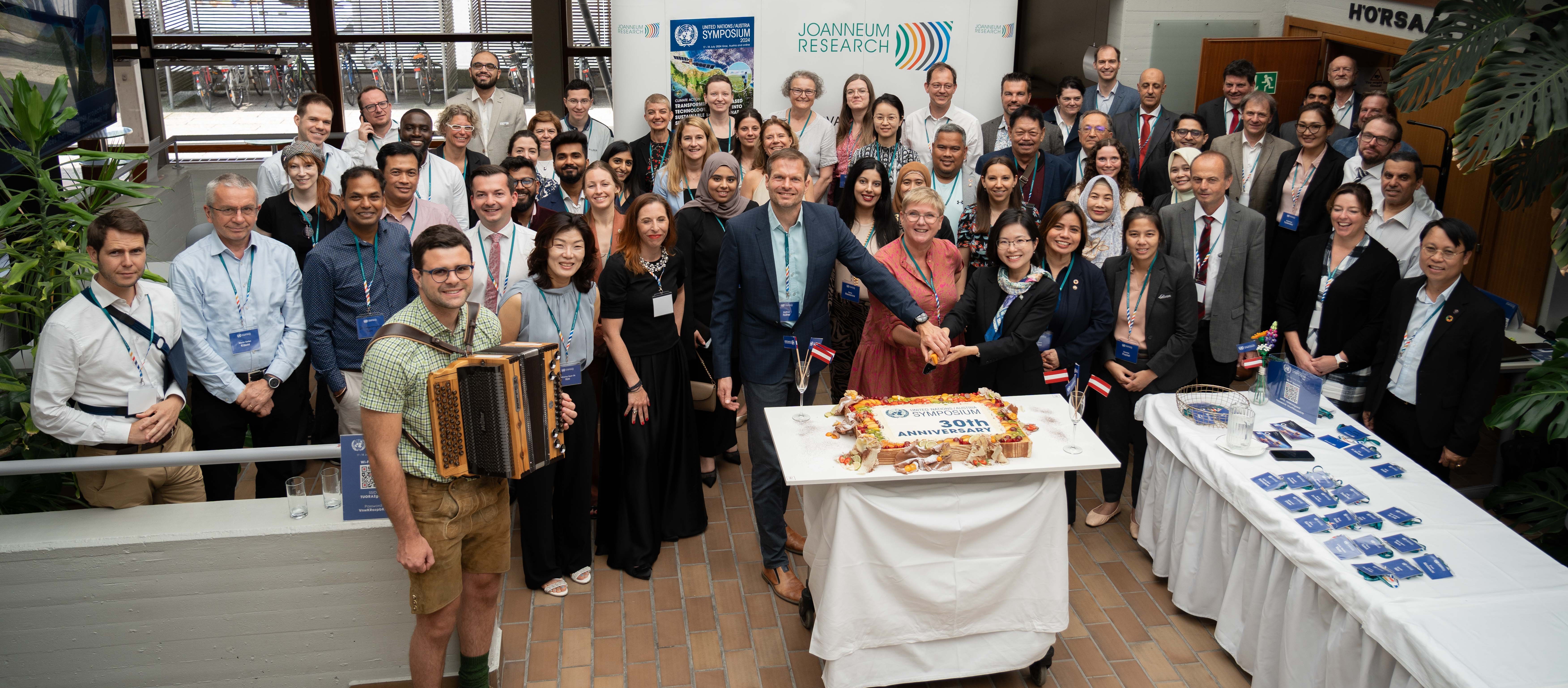
Practical information for in-person attendance
> SYMPOSIUM VENUE
The symposium will take place at Graz University of Technology, Institute of Communication Networks and Satellite Communications, in Lecture Hall I 2, on the ground floor.
Graz University of Technology
Institute of Communication Networks and Satellite Communications
Lecture hall I 2 (access from Sandgasse 38)
Inffeldgasse 12
8010 Graz, Austria
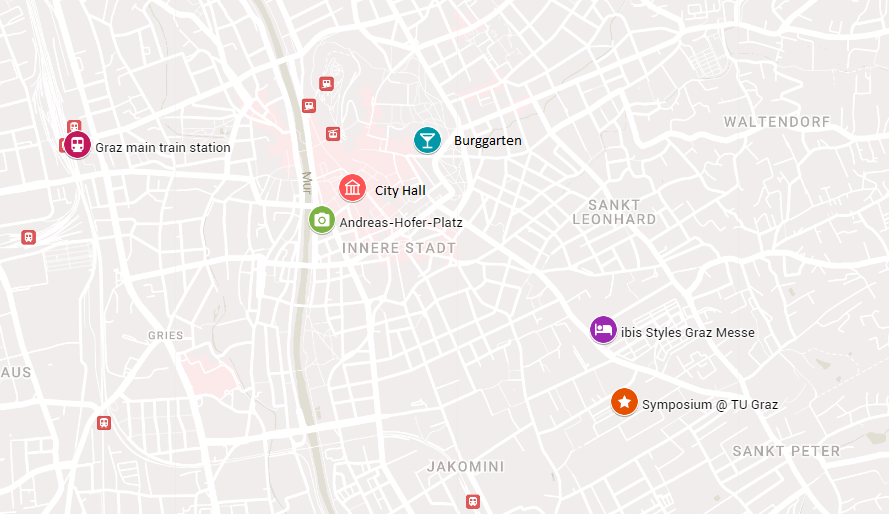
> HOW TO GET TO THE SYMPOSIUM VENUE
Arrival by car
- From north or south: via A9 Phyrn-Autobahn until junction Graz-West, then A2 Südautobahn in direction Vienna, further see below
- From east or west: A2 Südautobahn to junction Graz-Ost, then feeder road to exit Graz-Liebenau, then right into Münzgrabenstraße, approximately 2km, then right into Sandgasse to parking lot Sandgasse 38
Arrival by plane
- Nearest airport: Graz-Thalerhof: the journey by cab takes about 30 min.
Arrival by train
- Nearest train station: Graz-Hauptbahnhof: take tram line 6 in the direction of St. Peter to the station Schulzentrum St. Peter. Then walk along Inffeldgasse (west) to the campus. The institute (Inffeldgasse 12) is located on the right, northern side behind the new study center.
> ACCOMMODATION
Participants are encouraged to book their hotel room at Ibis Styles Graz Messe or Best Western.
> MEALS
Lunches on day 1 and 2 of the symposium will be provided at the canteen in the Graz University of Technology. In the evening of 16 July, there will be a reception hosted by the Mayor of Graz at the City Hall. In the evening of 17 July, there will be a reception hosted by the Governor of Styria at the Orangerie at the Burggarten. Lunches and receptions are offered to all in-person participants free-of-charge.
> ABOUT GRAZ
Graz is the capital city of the Austrian province of Styria and the second-largest city in Austria, after Vienna. As a university city more than 45.000 students are living in Graz. The old city of Graz and the castle Schloss Eggenberg are since 1999 and 2010 respectively UNESCO-world cultural heritage sights. Graz was designated the Cultural Capital of Europe in 2003, became a City of Culinary Delights in 2008, and is also recognized as a UNESCO City of Design within the Creative Cities Network. Please refer to the Graz Tourism for more information.
Background
The UN/Austria Symposium has taken place in Graz, Austria, since 1994. It is an activity of the Programme of Space Applications of the United Nations Office for Outer Space Affairs. Since the first symposium entitled "Enhancing Social, Economic and Environmental Security through Space Technology", more than 5,102 participants have attended the events. They addressed a variety of themes, ranging from security to youth, as well as the use of space for sustainable development, space accessibility, and international cooperation. This year's symposium will be the 30 th edition of this long-standing series.
The symposia series has provided a forum for discussion between different stakeholder groups of the wider space community, including the diplomatic community, the private sector and academia, as well as UN entities. The main purpose of the symposia remains to enable discussions and learning on the use of space tools and applications, with an interdisciplinary viewpoint, addressing technology development and policymaking.
Since 2020, the symposium engages in a series focusing on using space technologies, data and applications to address the unprecedented challenges posed by climate change, and in support of the United Nations Sustainable Development Goal 13: Climate Action.
Working methods
Speakers at the symposium are requested to deliver an oral presentation or a demonstration of a tool in-person in Graz, Austria. Remote presentation will not be considered.
Presentations made at the symposium will be published on the website of the Office for Outer Space Affairs (www.unoosa.org) prior to the symposium to facilitate the engagement of participants.
Language
The working language of the symposium is English.
Financial support
Within the limited financial resources available, the United Nations may provide funding for individuals selected as speaker and whose nationality is classified as a developing country. Speakers will be selected on a competitive basis, depending on their nationality and relevant professional or educational background. The UN will provide a round-trip air-ticket - most economic fare - between the airport of international departure in their home country and Graz and/or hotel room and board expenses for the duration of the symposium. For the list of developing countries, please refer to the annex of the "World Economic Situation and Prospects 2024" report, available at https://desapublications.un.org/publications/world-economic-situation-and-prospects-2024.
Successful applicants will be notified by May 2024.
Health insurance
Health insurance for each of the selected participants attending in person is necessary and is the responsibility of the participant or his/her institution or government. UNOOSA will not assume any responsibility for life and health insurance, nor for expenses related to medical treatment or accidents.
Sponsorship
The United Nations Office for Outer Space Affairs and Austria are responsible for organising the Symposium. It is supported by the Austrian Federal Ministry for European and International Affairs, the Federal Ministry for Climate Action, Environment, Energy, Mobility, Innovation and Technology, the European Space Agency, AUSTROSPACE, the City of Graz, the Province of Styria, JOANNEUM RESEARCH and the Graz University of Technology.
Contact
For additional information, please contact unoosa-events@un.org .
